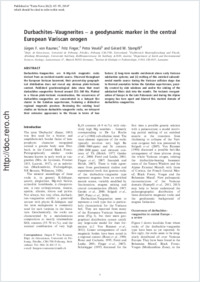Durbachites–Vaugnerites – a geodynamic marker in the central European Variscan orogen
- Raumer, Jürgen F. von Dépt. de Géosciences, Université de Fribourg, Switzerland
- Finger, Fritz Fachbereich Materialforschung und Physik, Abteilung Mineralogie, Universität Salzburg, Austria
- Veselá, Petra Department of Earth and Environmental Sciences, Geology, Munich, Germany
- Stampfli, Gérard M. Institut de Géologie et Paléontologie, Lausanne
-
01.04.2014
Published in:
- Terra Nova. - 2014, vol. 26, no. 2, p. 85–95
English
Durbachites–Vaugnerites are K–Mg-rich magmatic rocks derived from an enriched mantle source. Observed throughout the European Variscan basement, their present-day geographical distribution does not reveal any obvious plate-tectonic context. Published geochronological data show that most durbachites–vaugnerites formed around 335–340 Ma. Plotted in a Visean plate-tectonic reconstruction, the occurrences of durbachites–vaugnerites are concentrated in a hotspot like cluster in the Galatian superterrane, featuring a distinctive regional magmatic province. Reviewing the existing local studies on Variscan durbachite–vaugnerite rocks, we interpret their extensive appearance in the Visean in terms of two factors: (i) long-term mantle enrichment above early Variscan subduction systems; and (ii) melting of this enriched subcontinental mantle source during the Variscan collision stage due to thermal anomalies below the Galatian superterrane, possibly created by slab windows and and/or the sinking of the subducted Rheic slab into the mantle. The tectonic reorganization of Europe in the Late Palaeozoic and during the Alpine orogeny has torn apart and blurred this marked domain of durbachites–vaugnerites.
- Faculty
- Faculté des sciences et de médecine
- Department
- Département de Géosciences
- Language
-
- English
- Classification
- Geology
- License
- License undefined
- Identifiers
-
- RERO DOC 210088
- DOI 10.1111/ter.12071
- Persistent URL
- https://folia.unifr.ch/unifr/documents/303644
Statistics
Document views: 75
File downloads:
- rau_dvg.pdf: 285
